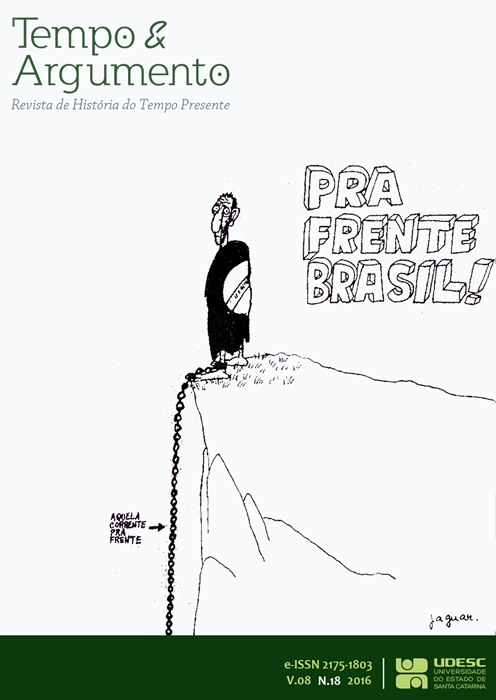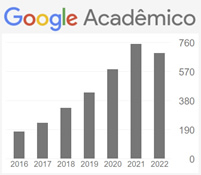Humor and politics in the deconstruction of superheroes in Latin America during the Cold War: the look of comics
Resumo
A medium associated with everyday life and juvenile entertainment, comics achieved full consolidation in Latin America in the post-Second World War years. During the Cold War and the massive U.S. cultural penetration in the region, comics were already seen in newspapers, where they were sometimes published in specific supplements, and also edited as comic books by specialized publishing houses. Amid debates about the advantages and disadvantages of comics for life that already mobilized those involved in the world of comics, the issue of cultural imperialism also led critics and local production to seek redefining the meanings of this medium in Latin America. One of the steps involved the effective defense of a “substitution of imports” from foreign producers, with a focus on the local creation of comics that could represent the national reality. To do this, there was a need to deconstruct some references from foreign comics, in order to put them into question before their reading community. This article analyzes this process through two case studies: the Brazilian cooperative CETPA (Cooperativa Editora de Trabalhos de Porto Alegre) and the Chilean publishing house Quimantú. In both of them, the focus primarily lied on superheroes, mixing parody and political criticism when discussing the superhero’s action in Latin America. Through the situations under analysis, we highlight this step for establishing comics as a cultural practice in the region.
Keywords: Comics; Superheroes; Latin America – History
Downloads
Referências
APPADURAI, Arjun. Introdução: mercadorias e a política de valor. In: APPADURAI, Arjun (Org.). A vida social das coisas: as mercadorias como bem cultural. Niterói: EDUFF, 2008, p. 15-88.
ARGUMEDO, Alcira. Los silencios y las voces en América Latina: notas sobre el pensamiento nacional y popular. Buenos Aires: Colihue, 2009.
BUKATMAN, Scott. A song for the urban superhero. In: HATFIELD, Charles; HEER, Jeet; WORCESTER, Kent (Org.). The superhero reader. Jackson: University Press of Mississippi, 2013. p. 170-198.
DOCUMENTOS secretos de la ITT. Santiago de Chile: Quimantú, 1972.
DORFMAN, Ariel. Prólogo no qual se mostram super-homens de verdade em ação. In: DORFMAN, Ariel; JOFRÉ, Manuel. Super-homem e seus amigos do peito. Rio de Janeiro: Paz e Terra, 1978. p. 15-18.
EBAL. Superman, n. 1, nov., 1947.
FLORES, Jorge Rojas. Historia de la infancia en el Chile republicano, 1810-2010. Santiago de Chile: JNJI, 2010.
FLORES, Jorge Rojas. Representaciones de la infancia en el espacio de las historietas, 1900-1980. Revista Chilena de Pediatria, v. 6, n. 83, p.614, 2012.
GABILLIET, Jean-Paul. “Fun in four colors”: comme la quadrichromie a créé la bande dessinée aux États-Units. Transatlantica, v. 4, n. 1, p. 1-8, 2005.
GABILLIET, Jean-Paul. Of comics and men: a cultural history of American comic books. Jackson: University Press of Mississippi, 2010.
GENÉ, Marcela. “Sisebutas” en Buenos Aires. Family strips de los años veinte. Antíteses, v. 5, n. 9, p. 181-204, jan./jul. 2012.
GROESTEEN, Thierry. Parodies: la bande dessinée au second degré. Paris: Skira Flammarion, 2010.
HATFIELD, Charles; HEER, Jeet; WORCESTER, Kent (Orgs.). The superhero reader. Jackson: University Press of Mississippi, 2013.
HEER, Jeet; WORCESTER, Kent (Orgs.). A comics studies reader. Jackson: University Press of Mississipi, 2009.
HUTCHEON, Linda. Uma teoria da paródia: ensinamento das formas de arte do século XX. Lisboa: Edições 70, 1989.
JAMESON, Fredric. Pós-modernidade e sociedade de consumo. Novos estudos CEBRAP, São Paulo, n. 12, p.16-26, jun., 1985.
JENNINGS, John. Superheroes by design. In: ROSENBERG, Robin; COOGAN, Peter (Orgs.). What is a superhero? New York: Oxford University Press, 2013, p. 59-63.
JOFRÉ, Manuel. As histórias em quadrinhos e suas transformações. In: DORFMAN, Ariel; JOFRÉ, Manuel. Super-homem e seus amigos do peito. Rio de Janeiro: Paz e Terra, 1978. p. 87-171.
JÚNIOR, Gonçalo. A Guerra dos gibis: formação do mercado editorial brasileiro e a censura nos quadrinhos. 1933-64. São Paulo: Companhia das Letras, 2004.
KOSELLECK, Reinhardt. Uma história dos conceitos: problemas teóricos e práticos. Estudos históricos, Rio de Janeiro, v. 5, n. 10, p. 134-146, 1992.
KUNZLE, David. Chile’s La Firme versus Itt. Latin American Perspectives, v. 5, n. 1, p. 119-133, jan., 1978.
LEVET, Natacha. Sherlock Holmes, du surhomme au supérheros. In: BOUCHER, François-Emmanüel; DAVID, Sylvain; PRÉVOST, Maxime (Orgs.). Mythologies du superhéros. Histoire, phylosophie, géographie, intermédialités. Liège: Universitaires de Liège, 2014. p. 69-81.
MACDOUGALL, Curtis. Newspaper syndication and its social significance. Annals of the American Academy of Political and Social Science, v. 219, s/n, p. 76-81, jan. 1942.
MARX, Karl; ENGELS, Friedrich. A ideologia alemã. São Paulo: Martins Fontes, 2001.
O’MAHONY, Mike. Sport in the USSR: physical culture-visual culture. London: Reaktion Books, 2006.
PEREIRA, Priscila. Entre a épica e a paródia: a (des) mistificação do gaúcho nos quadrinhos de Inodoro Pereyra, el renegau. 2011. Dissertação (Mestrado em História) – Universidade Estadual de Campinas, Instituto de Filosofia e Ciências Humanas, Campinas, 2011.
PRADO, Maria Lígia. Repensando a história comparada da América Latina. Revista de História, São Paulo, n. 153, p. 11-33, jul./dez. 2005.
PRÉVOST, Maxime. Mais où sont les superhéros d’antan? Porthos, Obélix et la puissance rétrospective. In: BOUCHER, François-Emmanüel; DAVID, Sylvain; PRÉVOST, Maxime (Orgs.). Mythologies du superhéros.. Histoire, phylosophie, géographie, intermédialités. Liège: Universitaires de Liège, 2014, p. 47-67.
QUIMANTÚ. Ganso, n. 1, Santiago de Chile, set. 1973.
QUIMANTÚ. Cabrochico, n. 3, Santiago de Chile, 1971.
QUIMANTÚ. Cabrochico, n. 4, Santiago de Chile, 1971.
QUIMANTÚ. Cabrochico, n. 5, Santiago de Chile, 1971.
REVEL, Jacques. Microanálise e construção do social. In: REVEL, Jacques (Org.). Jogos de escalas: a experiência da microanálise. Rio de Janeiro: Ed. FGV, 1998. p. 15-38.
SAVAGE JR., William. Comic books and America, 1945-1954. Norman: University of Oklahoma Press, 1990.
SAVRAMIS, Demosthenes. Der moderne Mensch zwischen Tarzan und Superman. In: SILBERMANN, Alphons; DYROFF, H.-D. (Org.). Comics and visual culture: research studies from 10 countries. München, New York, London, Paris: Saur, 1986, p. 254-264.
SLATTA, Richard W. The cowboy encyclopedia. Santa Barbara: ABC-Clio, 1994.
SMOLDEREN, Thierry. Naissances de la bande dessinée. De William Hogarth à Winsor McCay. Bruxelas: Les Impressions Nouvelles, 2009.
STEIN, Daniel; DENSON, Shane; MEYER, Christina (Org.). Transnational perspectives on graphic narratives. Comics at the crossroads. London/New York: Bloomsbury, 2013.
VENTORINI, Eliana. Regulação da leitura e da literatura infanto-juvenil, no Rio Grande do Sul, na década de 50: interdição, triagem e intervenção das autoridades. 2009. Dissertação (Mestrado em Educação) - Universidade Federal do Rio Grande do Sul, Faculdade de Educação, Porto Alegre, 2009.
ÚLTIMA HORA, Porto Alegre, 20 out. 1962.
ÚLTIMA HORA, Porto Alegre, 22 out. 1962.
ÚLTIMA HORA, Porto Alegre, 23 out. 1962.
ÚLTIMA HORA, Porto Alegre, 24 out. 1962.
ÚLTIMA HORA, Porto Alegre, 26 out. 1962.
ÚLTIMA HORA, Porto Alegre, 20 nov. 1962.
ÚLTIMA HORA, Porto Alegre, 29 nov. 1962.
ÚLTIMA HORA, Porto Alegre, 07 dez. 1962.
ÚLTIMA HORA, Porto Alegre, 08 dez. 1962.
WERNER, Michael ; ZIMMERMANN, Bénedict. Penserl’histoire croisée: entre empirie et reflexivité. Annales, v. 58, n. 1, p. 07-36, jan./fev. 2003.
WRIGHT, Bradford. Comic book nation: the transformation of youth culture in America. Baltimore: The John Hopkins University Press, 2001.
ZÁRATE, Verónica Valdivia Ortiz de. “¡Estamos en guerra, señores!”. El régimen militar de Pinochet y el “pueblo”, 1973-1980. Historia, v. 1, n. 43, p. 163-201, jan./jul. 2010.





